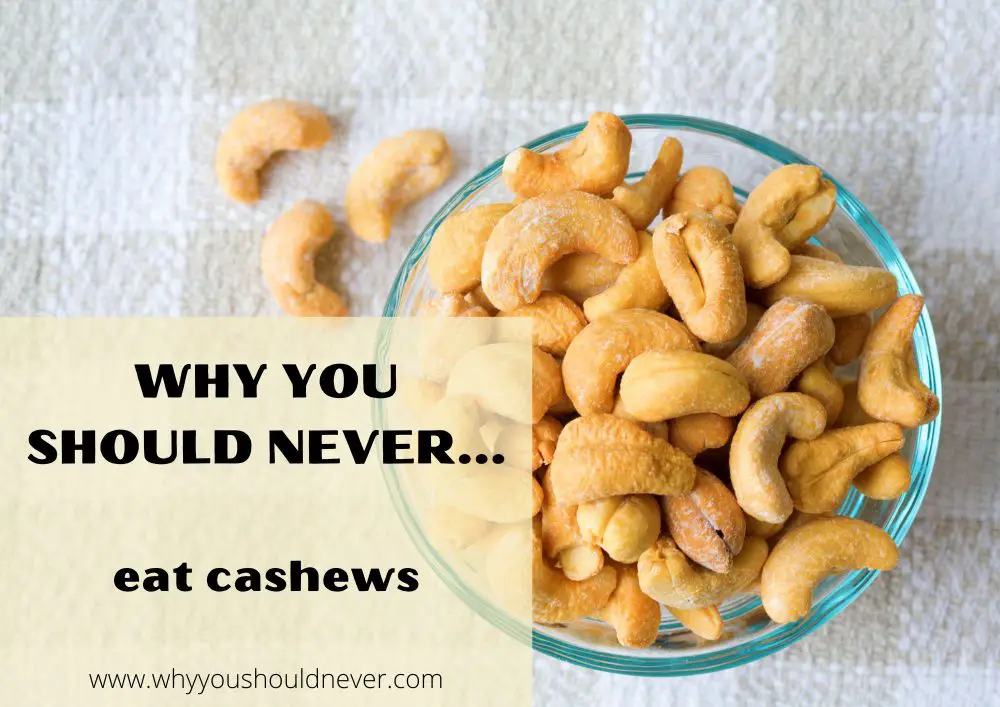![]()
Why You Should Never Eat Cashews
When it comes to nuts, cashews always seem to get the short end of the stick. Almonds are praised for their heart-healthy fats and high protein content, while pistachios are lauded for their antioxidant properties.
But what about cashews? Well, they’re often seen as the weaker option, nutritionally speaking. But is that the case? Let’s take a closer look at cashews so you can decide if you should really be eating them.
5 reasons why you shouldn’t eat cashews
1. Cashews are high in fat
Like most nuts, cashews are high in fat. In fact, most of the calories in cashews come from fat.
While some fats are good for you, too much of any type of fat can lead to weight gain. If you’re trying to lose some pounds or simply maintain a healthy weight, you may want to limit your intake of cashews.
2. Cashews are high in calories
As we mentioned above, the high-fat content in cashews leads to their high calories. One ounce of cashews contains 155 calories, which is more than what you’ll find in a comparable serving of almonds or pistachios.
If you’re watching your calorie intake, you may want to limit your portion sizes when it comes to cashews. Or, you could opt for another type of nut that’s lower in calories.
3. Cashews can wreak havoc on your digestive system
If you have a sensitive stomach, then you might want to stay away from cashews too. That’s because the fiber in cashews can actually act as a prebiotic, feeding the bad bacteria in your gut and potentially causing digestive issues.
Cashews also contain a type of soluble fiber called phytate. Phytate can bind to minerals like calcium, iron, and magnesium in the gut, making them less absorbable. This can lead to gastrointestinal issues like constipation, diarrhea, and bloating.
Also, if you’re going out in public, then you should probably skip eating cashews before you leave the house. That’s because they make you very gassy.
4. Cashews set off allergies
Cashews are the leading cause of tree nut allergies in the US. In fact, they’re one of the top ten allergens in the United States, along with peanuts, shellfish, and milk.
Cashews tend to be more allergenic than other nuts, so if you have a tree nut allergy, you may want to steer clear of them altogether.
Even if you don’t have an allergy, you may still want to be cautious when eating cashews, as they can cause an allergic reaction in other people you come in contact with.
5. Too many bad ones in the pack
When you buy a bag of cashews, you’re inevitably going to come across a few bad nuts. And by bad, we mean moldy or rancid.
Far too many cashew companies are negligent when it comes to quality control, which means that moldy or rancid cashews often make their way into bags.
These nuts can cause all sorts of stomach issues if you accidentally eat them, something that’s easy to do, seeing as you won’t know a cashew is moldy until you’ve bitten into it.
Conclusion
As far as snacks go, you could do a lot worse than cashews! Despite their downsides, they’re still a nutritious option that can be enjoyed in moderation and are much healthier than processed snacks like chips or cookies.
If you do choose to eat them, just remember to watch your portion sizes, and eat them as part of a balanced diet.
